An IP address is a unique identifier that distinguishes every computer using the Internet Protocol (IP) to communicate over a network. The string of numbers is unique to every device. Hence one can trace an individual’s internet activity to the device the person uses. This tracking violates user privacy and can expose one to the risk of cybersecurity threats.
Fortunately, one can hide an IP address to circumvent these problems because other third parties won’t be able to identify the device accessing websites on the internet. The four practical ways to hide an IP address are given below.
- Make use of a VPN.
- Use the TOR browser.
- Use a proxy server.
- Use public WiFi.

In addition to covering the steps for how to hide an IP address, the following guide will also address the underlying question: what is an IP address and how does an IP work?
1. Make Use of a VPN
Using a virtual private network (VPN) is one of the most effective solutions for hiding an IP address. A VPN is a software service that encrypts data sent over the internet.
The software acts as a mediator between a device and the internet. VPNs have servers in various global locations to which individuals connect. As such, IP addresses show the server location, but in the real sense, the internet user is somewhere else.
2. Use the TOR Browser
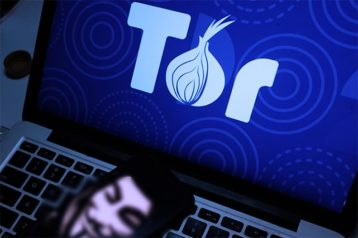
Using the TOR browser is another one of the methods involved in IP masking. The browser is a free anonymity network that encrypts users’ internet traffic via a random sequence of volunteer nodes (similar to proxy servers).
Websites can only see the exit node, which is the IP address of the final server in the sequence. When an individual using the TOR browser browses the internet, the series of nodes changes. Hence, tracking the individual’s original IP address is impractical.
3. Use a Proxy Server
Users can also utilize a proxy server to conceal IP addresses. The servers work like VPNs, acting as middlemen between devices and the internet.
Note: After assigning a new IP to the device, some proxies give users IP sessions lasting a particular time, with a new one put in place upon expiration. Hence, anyone snooping on the internet will not see a user’s IP address.
4. Use Public WiFi
Using public WiFi is another convenient IP address blocker because logging into the network changes the usual IP an internet user uses to browse online. Hence, an individual’s IP address is temporarily hidden because the public WiFi’s IP address is used for the period spent online.
What is an IP Address?
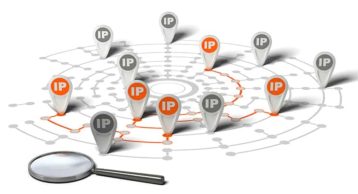
A person interested in understanding online privacy would be curious, what is an IP address? An IP address is a distinctive string of numbers belonging to every internet-connected device. Internet Protocol (IP) is an array of rules dictating the data format sent over a local network or the internet. Each device has a unique numerical address that helps identify the individual unit connected to a computer network.
The numerals in an IP address are separated by periods and appear as a four-number set, such as 195.142.1.25. Each set in the sequence has mathematically produced numbers ranging from 0 to 255. All IP addresses fall under this range: 0.0.0.0 to 255.255.255.255.
This is important:
IP addresses are visible to other internet users if an individual doesn’t conceal the identity of the device when browsing online. Exposed IPs pose significant cybersecurity risks because hackers can use the information to breach the device and steal or wipe the user’s data.
Why Should My IP Address be Hidden?
Individuals should conceal IP addresses to maintain online privacy. The addresses are markers that help websites identify where internet traffic comes from. Hence, an individual’s online activity is exposed when the IP address isn’t masked.
Internet service providers, governments and cybercriminals can trace internet activity to a particular device, which isn’t ideal in cases involving highly-sensitive data. Besides, hackers can access classified information from exposed IP addresses and use the data to steal from bank accounts or scam other people.
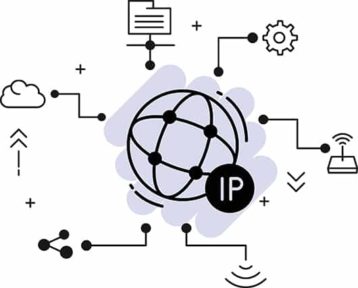
Therefore, hiding IP addresses is advisable to preserve online anonymity and prevent cybersecurity threats. Some of the benefits that await individuals seeking to hide an IP address are listed below.
- Avoid ad network tracking.
- Hide your ISP activity.
- Keep your private research secret.
- Keep your data safe from government surveillance.
- Overcome geographical barriers.
Read also: How to choose the best programs to protect the computer
1. Avoid Ad Network Tracking

Hiding an IP address helps individuals evade advertisement networks. The networks obtain a user’s information, including the browsing history, whenever that person uses the internet. Other networks ask users for permission to use the information to send advertisements.
However harmless this kind of marketing may be, some sites spam users with seemingly endless ads that become intrusive and bothersome. Hence, hiding IP addresses helps evade ad networks monitoring online activity to serve advertisements to internet users.
2. Hide Your ISP Activity

Concealing ISP activity is another benefit of hiding individuals’ IP addresses. Internet service providers (ISPs) track users’ online activities, especially in jurisdictions without legislation prohibiting the act.
Individuals with exposed IP addresses may experience ISP throttling, which happens when internet providers restrict users’ bandwidth or speed during high internet activity. Also, ISPs can sell customers’ data to other parties, such as marketers and advertisers, without consent. This further highlights the need for hiding IP addresses.
3. Keep your Private Research Secret
Hiding an IP address also helps preserve the anonymity of individuals researching highly classified data. People in the medical field, government officials, or military and security personnel are some groups dealing with sensitive information that shouldn’t reach unauthorized hands.
Also, one can be researching a secretive or dangerous topic, so the data leaking to the public is a significant risk. Fortunately, there are several ways to hide an IP address for free, preventing private information from being tracked and stolen from users’ devices.
4. Keep Your Data Safe from Government Surveillance
Some governments are known to snoop on citizens’ online activity, but hiding IP addresses is handy for individuals wanting to be excluded from surveillance. Many people are uncomfortable with the idea of governments freely monitoring every online activity, which is a significant invasion of privacy. Also, in some countries, citizens face restrictions on what sites are allowed to be accessed, all thanks to exposed IP addresses.
5. Overcome Geographical Barriers

Overcoming geographical barriers is another benefit of hiding IP addresses. Individuals traveling abroad may be dismayed to learn of restrictions on online content within specific regions. For instance, streaming certain content on Netflix can be impossible in countries where copyright laws restrict the same.
Concealing an IP address means the content-streaming service or website doesn’t identify the geographical location from which one is using the site. Hence, one can stream, watch or download any content, regardless of the place, as long as the device’s actual IP address remains secret.
Which VPNs are the Best for Hiding an IP Address?
The best VPNs to hide your IP address in 2022 are given below.
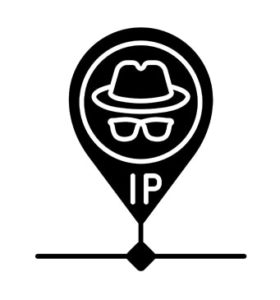
- ExpressVPN (Best Overall): This VPN service is arguably the best in the market. ExpressVPN owns private DNS servers and offers IP leak protection to users. Hence, users are assured that hackers cannot steal IP addresses with the VPN in place.
- CyberGhost (Best for Server Availability): The VPN has about 9,000 servers in 91 countries that individuals can connect to and conceal devices’ IP addresses.
- Private Internet Access (Best for Security Features): This platform has robust security features that hide users’ IP addresses and shield data from third-party access. Users can test the service for free via the 30-day money-back guarantee.
Are VPNs Necessary to Hide Your IP Address?
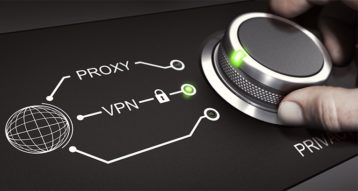
Yes, VPNs are necessary to conceal individuals’ IP addresses. The platforms allow users to connect to servers in a global network spanning several countries and regions.
For example, if an individual in the United States wants to conceal an IP address, the person can use a VPN to do so. The individual chooses a preferred location, such as a Romania-based server, and connects the device. Hence, anyone snooping on the person’s internet activities deems the individual to be in Romania even though the user is browsing from the U.S. Therefore, VPNs are a necessity for anyone seeking to maintain online privacy.
There are plenty of VPN services available for free, but one can pay a subscription to enjoy the networks’ premium IP protection features.
